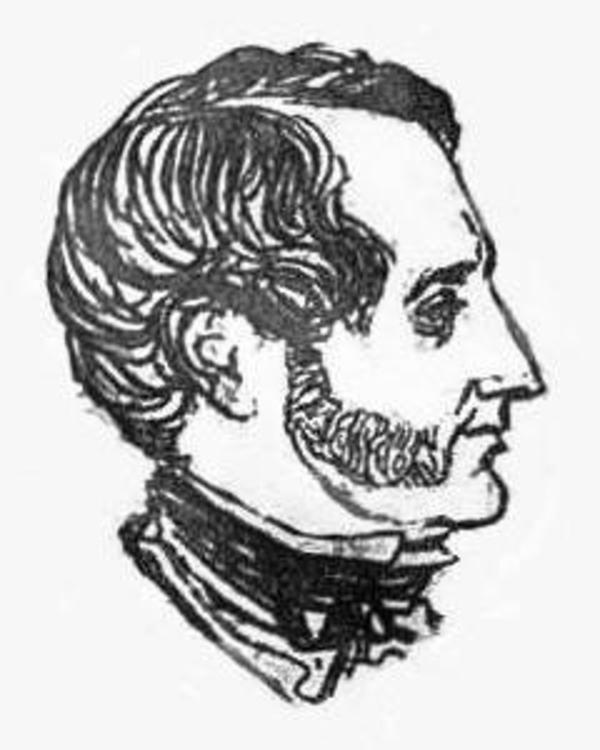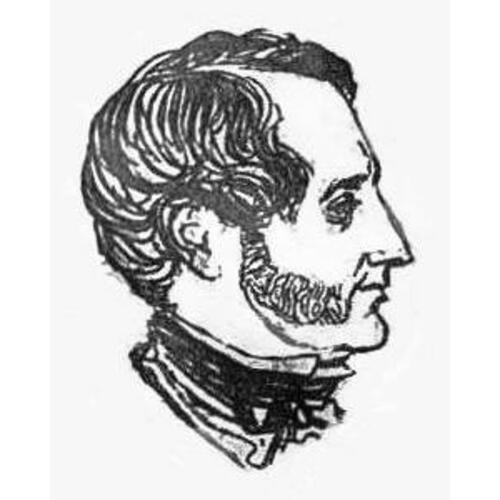
Source: Courtesy of Wikimedia Commons
FERRES, JAMES MOIR, journalist, politician, and public servant; b. in 1813 in Scotland; m. in 1834 at Montreal Sarah Robertson, a native of Aberdeen; d. 21 April 1870 in Kingston, Ont.
The young James Moir Ferres arrived at Montreal in 1833. His academic success as a student at the Grammar School, and later at Marischal College, in Aberdeen, led to a brief teaching career in Montreal at Edward Black*’s school and soon after to his assuming charge of the academy at Frelighsburg in the Eastern Townships. There, in 1835, he founded with Joseph D. Gilman a weekly newspaper, the Missiskoui Standard, the first of a series of platforms from which Ferres expressed his powerful opinions. Unfortunately, as even a friendly source observed, “He seemed only to think of how he could best damage or destroy.” Until his departure from the editorship of the Standard in December 1836, Ferres maintained a strongly anti-Patriote policy, urging the townships’ resistance to the “pseudo” reform and mounting “despotism of a few” in the lower province.
Ferres’ strident Toryism attracted the attention and approval of Adam Thom*, editor of the Montreal Herald, on whose urging he moved to Montreal, apparently late in 1836, to take up a position. He became editor of the Herald in 1839. His firm support for Governor General Charles Edward Poulett Thomson* led to his appointment in June 1840 as secretary of the Montreal Turnpike Trust. He remained an active Tory partisan, however, and, expecting to be dismissed, prudently resigned his office when the Reformers took over the government in 1842. He became editor of the Montreal Herald again until 1843 when, on the death of the proprietor, Robert Weir, he left the paper over “a difference of opinion” with the trustees of the estate. On the return of the Conservatives to power in 1844, Ferres was appointed revenue inspector for the second division of the District of Montreal; the Reformers considered this “a vile political job,” created especially for him “for having been useful to Mr. Smith [James Smith],” the new Tory member of the Executive Council from Missisquoi. This lucrative position ended abruptly with the formation of the Louis-Hippolyte La Fontaine and Robert Baldwin* ministry in 1848. It immediately removed Ferres for participating in the late elections in Shefford County, civil servants being forbidden to engage in such activity. The incident provoked a lively provincial debate which Ferres fuelled by sarcastic letters to the Montreal Gazette, widely reprinted, ridiculing Lord Elgin [Bruce], the Reform party, and the partisan nature of responsible government.
In December 1848 Ferres became editor and chief proprietor of the Montreal Gazette, immediately taking a lead in the local business community against the British “madness of Free Trade.” He soon turned violently anti-French Canadian over the rebellion losses legislation of the Reformers. The sparks from the verbal “fiery cross” he promised to forward through the Anglo-Saxon community contributed immeasurably to the general Tory agitation in the city and the consequent burning of the parliament buildings in April 1849. Throughout the winter Ferres had railed against the bill as “a nefarious attempt at robbery” of the Anglo-Saxon population by “an insignificant French nationality in a corner of Canada.” In the aftermath of the destruction of the parliament buildings, Ferres, a victim of his overheated syntax, was among the small group arrested for arson. He was, nevertheless, soon released on bail and the case evidently never came to trial.
Although he believed annexation to be a probability, Ferres nevertheless considered the Montreal Annexation Manifesto of October 1849 as a hasty approach, preferring instead a cautious movement towards independence. By early 1850 he had become critical of any union because of his objections to slavery in the United States.
Ferres remained editor of the Montreal Gazette until 1854 when the journal was sold to John Lowe and Brown Chamberlin. That year he entered parliament as a Tory from Missisquoi-East, defeating another Tory, Bartholomew Conrad Augustus Gugy*; he was returned for Brome, a subdivision of his previous riding, in 1858. His political career was undistinguished and, declining to contest the seat in 1861, he accepted a position on the newly created Board of Inspectors of Asylums and Prisons.
With his fellow inspectors Ferres urged a programme of general prison reform. In 1868 he became chairman of the board, and in May 1869, at the request of Sir John A. Macdonald*, warden of Kingston Penitentiary. During the following months, plagued by failing health, he instituted reform measures balanced by a degree of economic retrenchment. He died in April 1870. Ferres had created numerous enemies throughout his public life, but his successor at Kingston claimed that he had “. . . greatly advanced the cause of humanity and civilization among the . . . inmates . . . ; that he is generally regretted by them, forms not the meanest tribute to his memory.
PAC, MG 30, D62, 12, pp.723–27. Can., Sessional papers, 1867–68, VIII, no.40; 1870, II, no.5; 1871, III, no.6. Macdonald, Letters (Johnson and Stelmack), I, 233–34. Gazette (Montreal) 13, 20 Dec. 1848, 16 Feb., 11, 23 Oct. 1849, 30 Jan. 1850, 18 Nov. 1853, 26 April 1870. Missiskoui Standard (Frelighsburg, [Que.]), 8 April 1835–6 Dec. 1836. Pilot and Journal of Commerce (Montreal), 6, 11, 13 April 1848. Beaulieu et Hamelin, Jonrnaux du Quebec. Canada directory, 1857–58. Atherton, Montreal, II, 301. L. [-A.] Groulx, Notre maitre le passé (3 sér., Montréal, 1924–46), 3e sér. L.-P. Turcotte, Canada sous l’Union, II, 112. “Les disparus,” BRH, XXXII (1926), 436.
Cite This Article
Lorne Ste. Croix, “FERRES, JAMES MOIR,” in Dictionary of Canadian Biography, vol. 9, University of Toronto/Université Laval, 2003–, accessed December 20, 2025, https://www.biographi.ca/en/bio/ferres_james_moir_9E.html.
The citation above shows the format for footnotes and endnotes according to the Chicago manual of style (16th edition). Information to be used in other citation formats:
| Permalink: | https://www.biographi.ca/en/bio/ferres_james_moir_9E.html |
| Author of Article: | Lorne Ste. Croix |
| Title of Article: | FERRES, JAMES MOIR |
| Publication Name: | Dictionary of Canadian Biography, vol. 9 |
| Publisher: | University of Toronto/Université Laval |
| Year of publication: | 1976 |
| Year of revision: | 1976 |
| Access Date: | December 20, 2025 |



